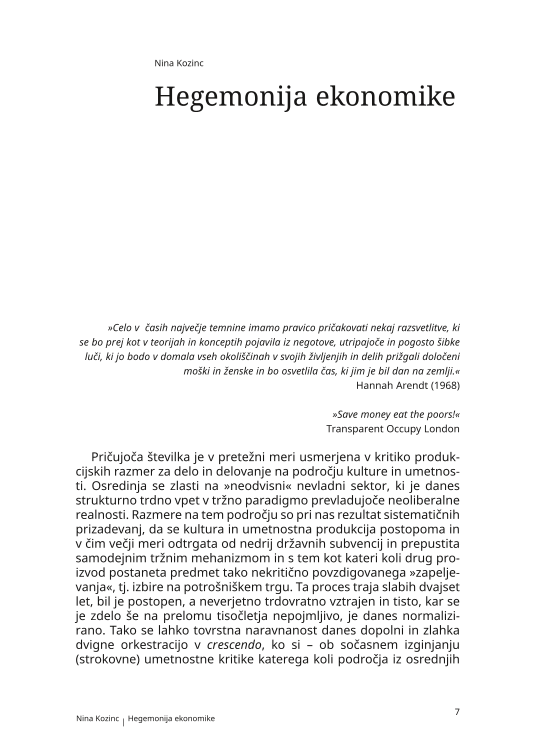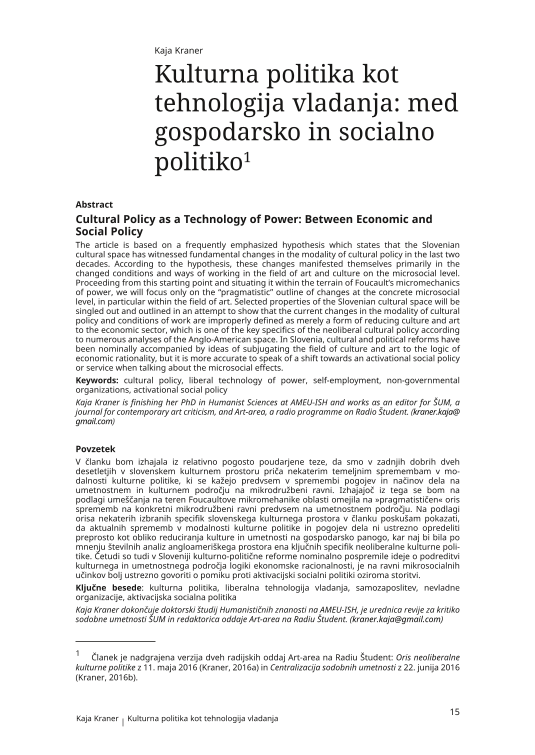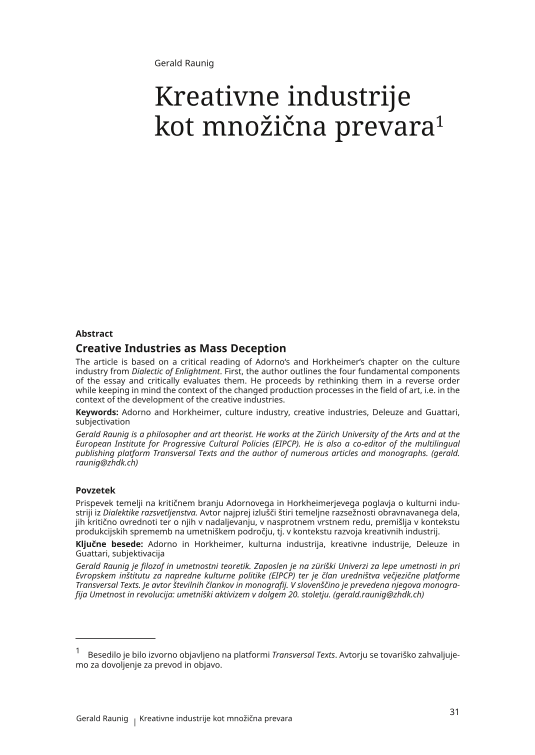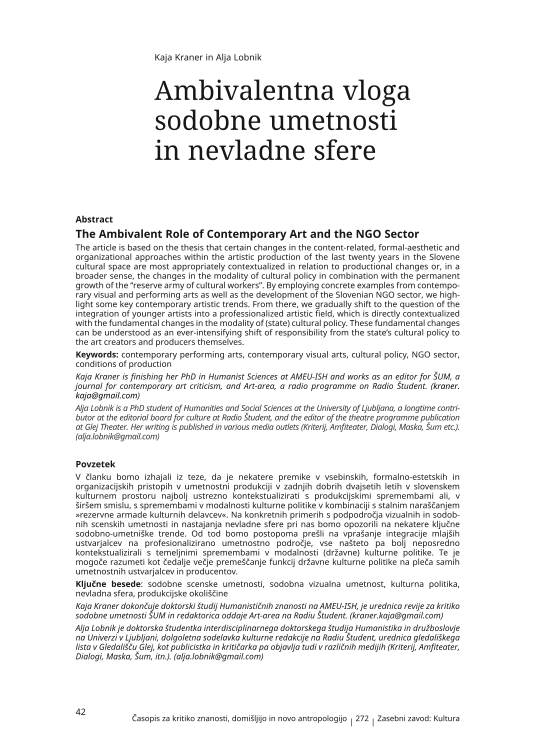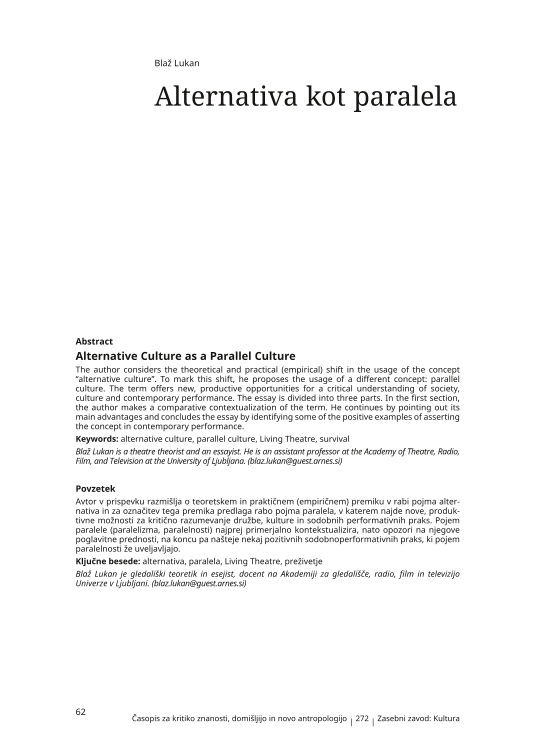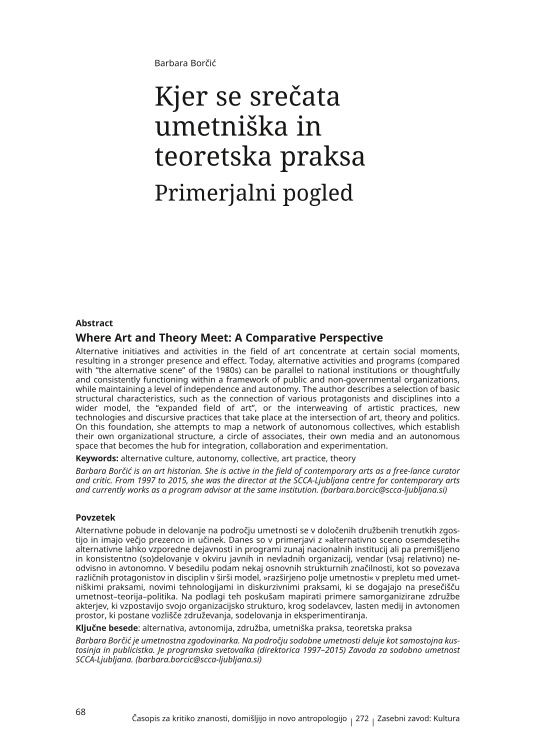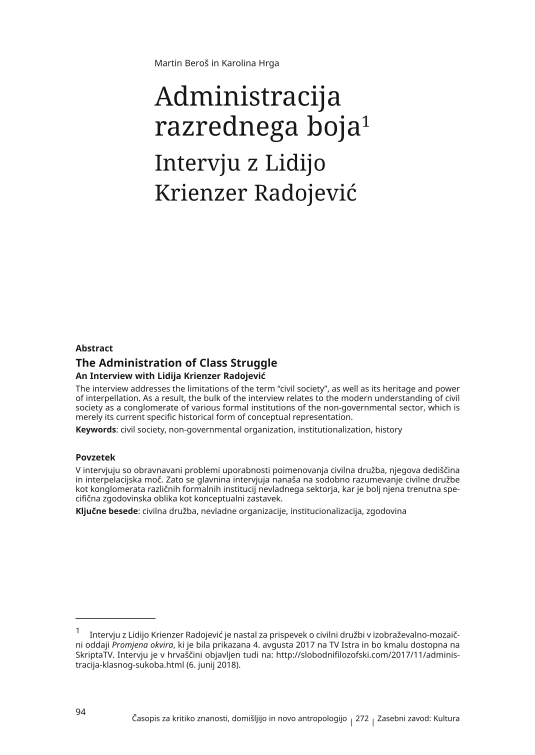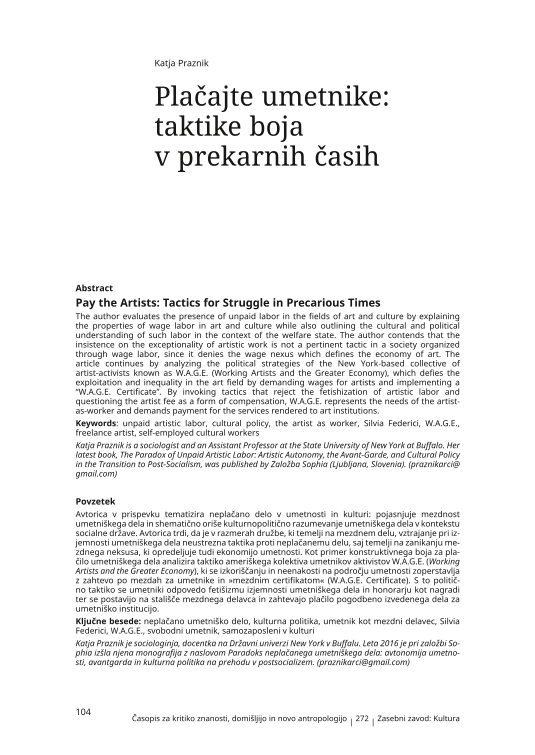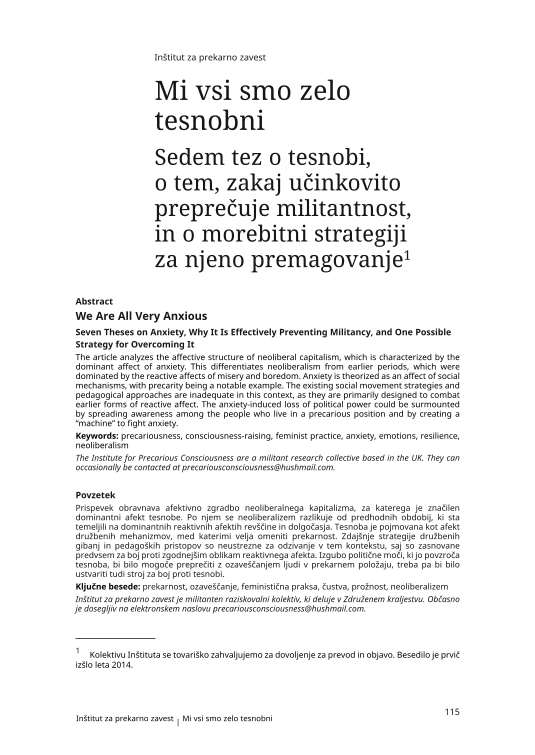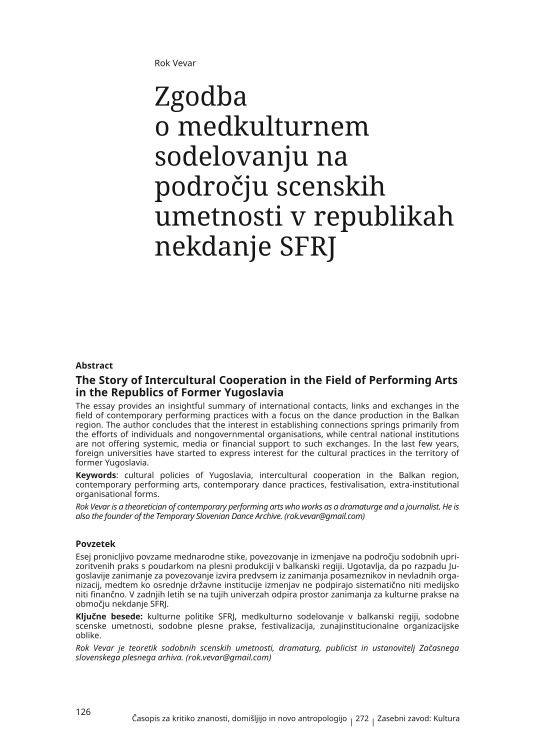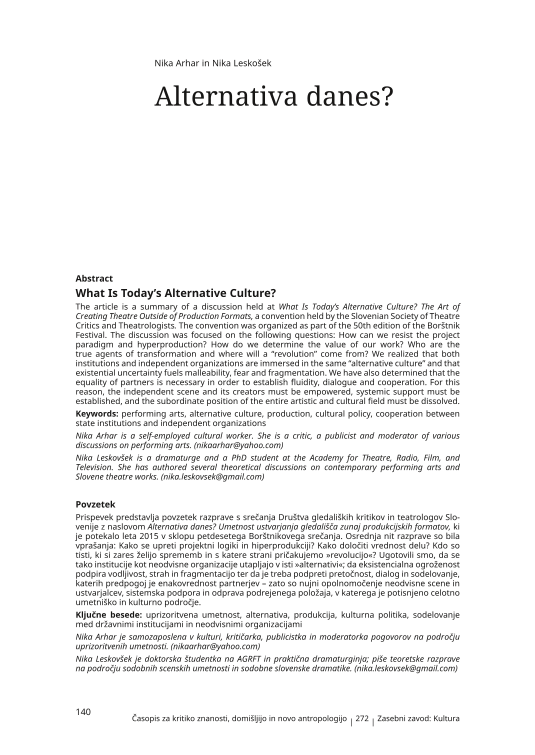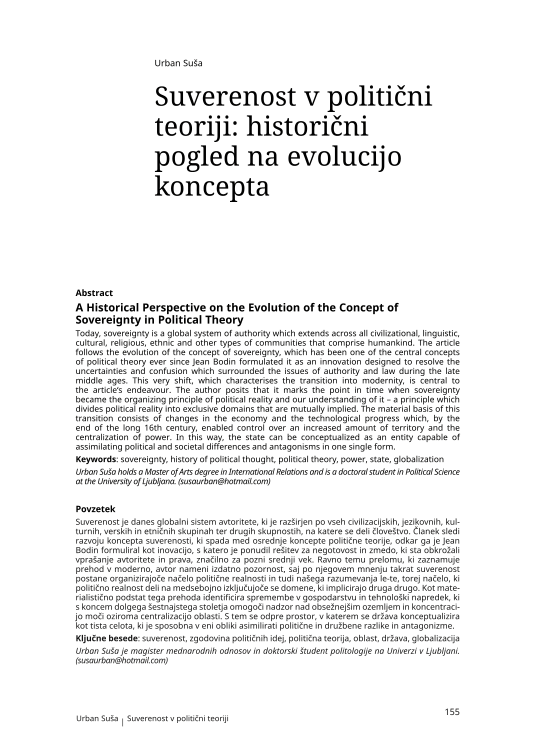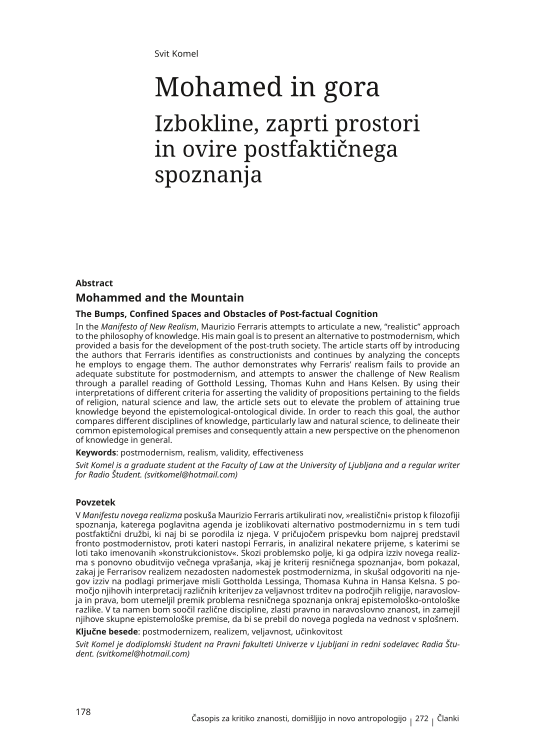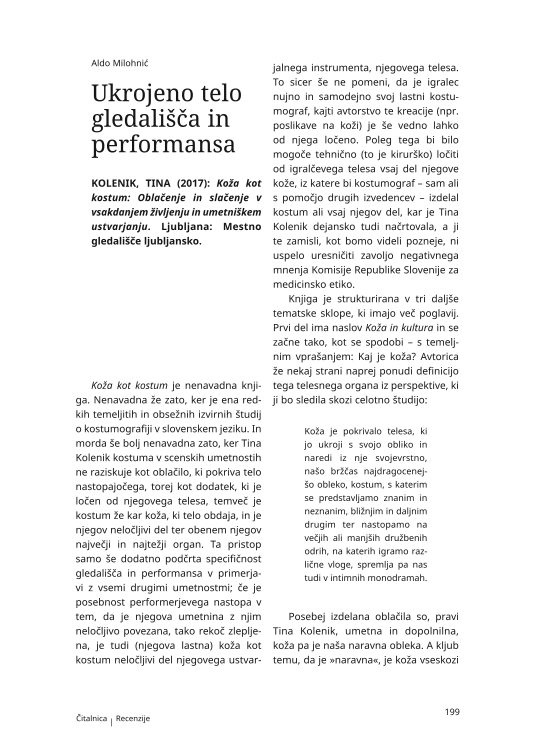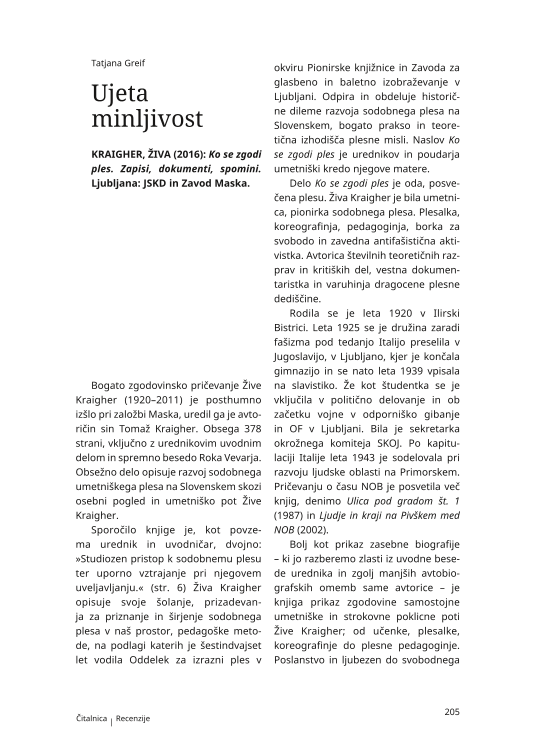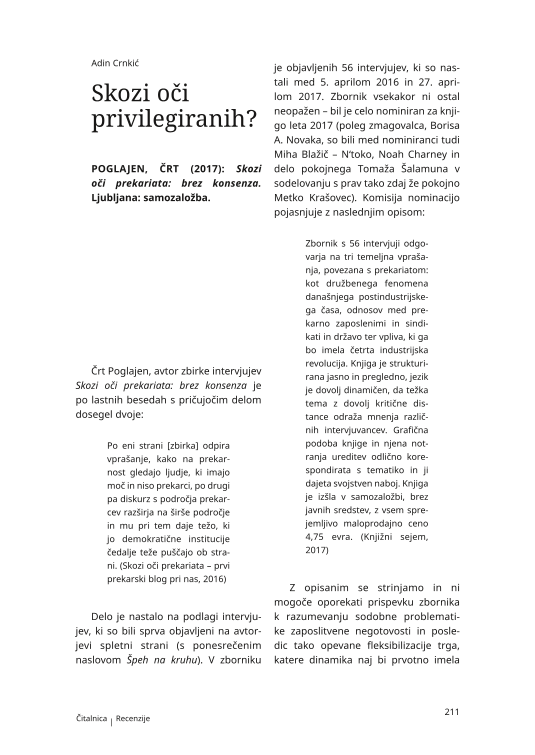Pričujoča številka je v pretežni meri usmerjena v kritiko produkcijskih razmer za delo in delovanje na področju kulture in umetnosti. Osredinja se zlasti na »neodvisni« nevladni sektor, ki je danes strukturno trdno vpet v tržno paradigmo prevladujoče neoliberalne realnosti. Razmere na tem področju so pri nas rezultat sistematičnih prizadevanj, da se kultura in umetnostna produkcija postopoma in v čim večji meri odtrgata od nedrij državnih subvencij in prepustita samodejnim tržnim mehanizmom in s tem kot kateri koli drug proizvod postaneta predmet tako nekritično povzdigovanega »zapeljevanja«, tj. izbire na potrošniškem trgu. Ta proces traja slabih dvajset let, bil je postopen, a neverjetno trdovratno vztrajen in tisto, kar se je zdelo še na prelomu tisočletja nepojmljivo, je danes normalizirano. Tako se lahko tovrstna naravnanost danes dopolni in zlahka dvigne orkestracijo v crescendo, ko si – ob sočasnem izginjanju (strokovne) umetnostne kritike katerega koli področja iz osrednjih medijev in epidemije vsakršnih mnenj – ljudski glas na družabnih omrežjih prisvoji vlogo ocenjevalca sodobnih umetnosti in v skrajni instanci zahteva ukinitev javnih subvencij, kar se je v vsej vulgarnosti pokazalo ob napadih na letošnji nagrajenki Prešernovega sklada, Simono Semenič in Majo Smrekar.
The article is based on a frequently emphasized hypothesis which states that the Slovenian cultural space has witnessed fundamental changes in the modality of cultural policy in the last two decades. According to the hypothesis, these changes manifested themselves primarily in the changed conditions and ways of working in the field of art and culture on the microsocial level. Proceeding from this starting point and situating it within the terrain of Foucault’s micromechanics of power, we will focus only on the “pragmatistic” outline of changes at the concrete microsocial level, in particular within the field of art. Selected properties of the Slovenian cultural space will be singled out and outlined in an attempt to show that the current changes in the modality of cultural policy and conditions of work are improperly defined as merely a form of reducing culture and art to the economic sector, which is one of the key specifics of the neoliberal cultural policy according to numerous analyses of the Anglo-American space. In Slovenia, cultural and political reforms have been nominally accompanied by ideas of subjugating the field of culture and art to the logic of economic rationality, but it is more accurate to speak of a shift towards an activational social policy or service when talking about the microsocial effects.
The article is based on a critical reading of Adorno‘s and Horkheimer‘s chapter on the culture industry from Dialectic of Enlightment. First, the author outlines the four fundamental components of the essay and critically evaluates them. He proceeds by rethinking them in a reverse order while keeping in mind the context of the changed production processes in the field of art, i.e. in the context of the development of the creative industries.
The article is based on the thesis that certain changes in the content-related, formal-aesthetic and organizational approaches within the artistic production of the last twenty years in the Slovene cultural space are most appropriately contextualized in relation to productional changes or, in a broader sense, the changes in the modality of cultural policy in combination with the permanent growth of the “reserve army of cultural workers”. By employing concrete examples from contemporary visual and performing arts as well as the development of the Slovenian NGO sector, we highlight some key contemporary artistic trends. From there, we gradually shift to the question of the integration of younger artists into a professionalized artistic field, which is directly contextualized with the fundamental changes in the modality of (state) cultural policy. These fundamental changes can be understood as an ever-intensifying shift of responsibility from the state’s cultural policy to the art creators and producers themselves.
The author considers the theoretical and practical (empirical) shift in the usage of the concept “alternative culture”. To mark this shift, he proposes the usage of a different concept: parallel culture. The term offers new, productive opportunities for a critical understanding of society, culture and contemporary performance. The essay is divided into three parts. In the first section, the author makes a comparative contextualization of the term. He continues by pointing out its main advantages and concludes the essay by identifying some of the positive examples of asserting the concept in contemporary performance.
Alternative initiatives and activities in the field of art concentrate at certain social moments, resulting in a stronger presence and effect. Today, alternative activities and programs (compared with “the alternative scene” of the 1980s) can be parallel to national institutions or thoughtfully and consistently functioning within a framework of public and non-governmental organizations, while maintaining a level of independence and autonomy. The author describes a selection of basic structural characteristics, such as the connection of various protagonists and disciplines into a wider model, the “expanded field of art”, or the interweaving of artistic practices, new technologies and discursive practices that take place at the intersection of art, theory and politics. On this foundation, she attempts to map a network of autonomous collectives, which establish their own organizational structure, a circle of associates, their own media and an autonomous space that becomes the hub for integration, collaboration and experimentation.
The interview addresses the limitations of the term “civil society”, as well as its heritage and power of interpellation. As a result, the bulk of the interview relates to the modern understanding of civil society as a conglomerate of various formal institutions of the non-governmental sector, which is merely its current specific historical form of conceptual representation.
The author evaluates the presence of unpaid labor in the fields of art and culture by explaining the properties of wage labor in art and culture while also outlining the cultural and political understanding of such labor in the context of the welfare state. The author contends that the insistence on the exceptionality of artistic work is not a pertinent tactic in a society organized through wage labor, since it denies the wage nexus which defines the economy of art. The article continues by analyzing the political strategies of the New York-based collective of artist-activists known as W.A.G.E. (Working Artists and the Greater Economy), which defies the exploitation and inequality in the art field by demanding wages for artists and implementing a “W.A.G.E. Certificate”. By invoking tactics that reject the fetishization of artistic labor and questioning the artist fee as a form of compensation, W.A.G.E. represents the needs of the artist-as-worker and demands payment for the services rendered to art institutions.
The article analyzes the affective structure of neoliberal capitalism, which is characterized by the dominant affect of anxiety. This differentiates neoliberalism from earlier periods, which were dominated by the reactive affects of misery and boredom. Anxiety is theorized as an affect of social mechanisms, with precarity being a notable example. The existing social movement strategies and pedagogical approaches are inadequate in this context, as they are primarily designed to combat earlier forms of reactive affect. The anxiety-induced loss of political power could be surmounted by spreading awareness among the people who live in a precarious position and by creating a “machine” to fight anxiety.
The Story of Intercultural Cooperation in the Field of Performing Arts in the Republics of Former Yugoslavia
(
The essay provides an insightful summary of international contacts, links and exchanges in the field of contemporary performing practices with a focus on the dance production in the Balkan region. The author concludes that the interest in establishing connections springs primarily from the efforts of individuals and nongovernmental organisations, while central national institutions are not offering systemic, media or financial support to such exchanges. In the last few years, foreign universities have started to express interest for the cultural practices in the territory of former Yugoslavia.
The article is a summary of a discussion held at What Is Today’s Alternative Culture? The Art of Creating Theatre Outside of Production Formats, a convention held by the Slovenian Society of Theatre Critics and Theatrologists. The convention was organized as part of the 50th edition of the Borštnik Festival. The discussion was focused on the following questions: How can we resist the project paradigm and hyperproduction? How do we determine the value of our work? Who are the true agents of transformation and where will a “revolution” come from? We realized that both institutions and independent organizations are immersed in the same “alternative culture” and that existential uncertainty fuels malleability, fear and fragmentation. We have also determined that the equality of partners is necessary in order to establish fluidity, dialogue and cooperation. For this reason, the independent scene and its creators must be empowered, systemic support must be established, and the subordinate position of the entire artistic and cultural field must be dissolved.
A Historical Perspective on the Evolution of the Concept of Sovereignty in Political Theory
(
Today, sovereignty is a global system of authority which extends across all civilizational, linguistic, cultural, religious, ethnic and other types of communities that comprise humankind. The article follows the evolution of the concept of sovereignty, which has been one of the central concepts of political theory ever since Jean Bodin formulated it as an innovation designed to resolve the uncertainties and confusion which surrounded the issues of authority and law during the late middle ages. This very shift, which characterises the transition into modernity, is central to the article‘s endeavour. The author posits that it marks the point in time when sovereignty became the organizing principle of political reality and our understanding of it – a principle which divides political reality into exclusive domains that are mutually implied. The material basis of this transition consists of changes in the economy and the technological progress which, by the end of the long 16th century, enabled control over an increased amount of territory and the centralization of power. In this way, the state can be conceptualized as an entity capable of assimilating political and societal differences and antagonisms in one single form.
Mohammed and the Mountain: The Bumps, Confined Spaces and Obstacles of Post-factual Cognition
(
In the Manifesto of New Realism, Maurizio Ferraris attempts to articulate a new, “realistic” approach to the philosophy of knowledge. His main goal is to present an alternative to postmodernism, which provided a basis for the development of the post-truth society. The article starts off by introducing the authors that Ferraris identifies as constructionists and continues by analyzing the concepts he employs to engage them. The author demonstrates why Ferraris’ realism fails to provide an adequate substitute for postmodernism, and attempts to answer the challenge of New Realism through a parallel reading of Gotthold Lessing, Thomas Kuhn and Hans Kelsen. By using their interpretations of different criteria for asserting the validity of propositions pertaining to the fields of religion, natural science and law, the article sets out to elevate the problem of attaining true knowledge beyond the epistemological-ontological divide. In order to reach this goal, the author compares different disciplines of knowledge, particularly law and natural science, to delineate their common epistemological premises and consequently attain a new perspective on the phenomenon of knowledge in general.
KOLENIK, TINA (2017): Koža kot kostum: Oblačenje in slačenje v vsakdanjem življenju in umetniškem ustvarjanju. Ljubljana: Mestno gledališče ljubljansko.
Koža kot kostum je nenavadna knjiga. Nenavadna že zato, ker je ena redkih temeljitih in obsežnih izvirnih študij o kostumografiji v slovenskem jeziku. In morda še bolj nenavadna zato, ker Tina Kolenik kostuma v scenskih umetnostih ne raziskuje kot oblačilo, ki pokriva telo nastopajočega, torej kot dodatek, ki je ločen od njegovega telesa, temveč je kostum že kar koža, ki telo obdaja, in je njegov neločljivi del ter obenem njegov največji in najtežji organ. Ta pristop samo še dodatno podčrta specifičnost gledališča in performansa v primerjavi z vsemi drugimi umetnostmi; če je posebnost performerjevega nastopa v tem, da je njegova umetnina z njim neločljivo povezana, tako rekoč zlepljena, je tudi (njegova lastna) koža kot kostum neločljivi del njegovega ustvarjalnega instrumenta, njegovega telesa. To sicer še ne pomeni, da je igralec nujno in samodejno svoj lastni kostumograf, kajti avtorstvo te kreacije (npr. poslikave na koži) je še vedno lahko od njega ločeno. Poleg tega bi bilo mogoče tehnično (to je kirurško) ločiti od igralčevega telesa vsaj del njegove kože, iz katere bi kostumograf – sam ali s pomočjo drugih izvedencev – izdelal kostum ali vsaj njegov del, kar je Tina Kolenik dejansko tudi načrtovala, a ji te zamisli, kot bomo videli pozneje, ni uspelo uresničiti zavoljo negativnega mnenja Komisije Republike Slovenije za medicinsko etiko.
KRAIGHER, ŽIVA (2016): Ko se zgodi ples. Zapisi, dokumenti, spomini. Ljubljana: JSKD in Zavod Maska.
Bogato zgodovinsko pričevanje Žive Kraigher (1920–2011) je posthumno izšlo pri založbi Maska, uredil ga je avtoričin sin Tomaž Kraigher. Obsega 378 strani, vključno z urednikovim uvodnim delom in spremno besedo Roka Vevarja. Obsežno delo opisuje razvoj sodobnega umetniškega plesa na Slovenskem skozi osebni pogled in umetniško pot Žive Kraigher.
Sporočilo knjige je, kot povzema urednik in uvodničar, dvojno: »Studiozen pristop k sodobnemu plesu ter uporno vztrajanje pri njegovem uveljavljanju.« (str. 6) Živa Kraigher opisuje svoje šolanje, prizadevanja za priznanje in širjenje sodobnega plesa v naš prostor, pedagoške metode, na podlagi katerih je šestindvajset let vodila Oddelek za izrazni ples v okviru Pionirske knjižnice in Zavoda za glasbeno in baletno izobraževanje v Ljubljani. Odpira in obdeluje historične dileme razvoja sodobnega plesa na Slovenskem, bogato prakso in teoretična izhodišča plesne misli. Naslov Ko se zgodi ples je urednikov in poudarja umetniški kredo njegove matere.
POGLAJEN, ČRT (2017): Skozi oči prekariata: brez konsenza. Ljubljana: samozaložba.
Črt Poglajen, avtor zbirke intervjujev Skozi oči prekariata: brez konsenza je po lastnih besedah s pričujočim delom dosegel dvoje:
Po eni strani [zbirka] odpira vprašanje, kako na prekarnost gledajo ljudje, ki imajo moč in niso prekarci, po drugi pa diskurz s področja prekarcev razširja na širše področje in mu pri tem daje težo, ki jo demokratične institucije čedalje teže puščajo ob strani. (Skozi oči prekariata – prvi prekarski blog pri nas, 2016)




